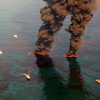FOR IMMEDIATE RELEASE, [April 6, 2018]
CNLOPB not aligned with federal priorities
KJIPUKTUK [HALIFAX, NS] – The Canada Newfoundland Offshore Petroleum Board (CNLOPB) has released information on oil and gas bids detailing lease areas available for 2018 – and these areas directly overlap a large fisheries closure announced in December by the Department of Fisheries and Oceans. The Northeast Slope area, totaling 46,833km2, was selected for protection because of high concentrations of sensitive seafloor species including seapens, corals and sponges as well as for deep water canyons that are habitat for bottlenose whales. This area is being counted by the government towards its international commitment to protect 10% of coastal and marine areas by 2020.
“Fishermen and their representatives, conservation organizations, the province of Newfoundland and the Department of Fisheries and Oceans worked hard to come to agreement on protecting this area – one of the last core areas for Northern cod.” says Susanna Fuller, Senior Marine Coordinator at the Ecology Action Centre and also a member of the marine conservation working group that discussed objectives and boundaries of the Northeast Slope. “We are extremely disappointed that the CNLOPB and its federal counterparts would not have collaborated to ensure no new industrial activity in this area.”
While Canada is working towards implementing marine protected areas under the Oceans Act and the National Marine Conservation Areas Act, and is in the process of amending the Oceans Act and the Canada Petroleum Resources Act, large areas have been closed to fishing activity under the Fisheries Act.
“We have generally supported the efforts of DFO to close areas to all bottom fishing through the more efficient mechanism of the Fisheries Act,” says Fuller. “However, we have also been strongly advocating for no industrial activity in any areas that are to going to be counted towards protection targets.”
The fishing industry has been largely proactive on many fisheries closures in Atlantic Canada.
“It is time that other industries make an effort as well,” says Travis Aten, Marine Conservation Officer at the Ecology Action Centre. “The actions by the CNLOPB further question their role in environmental assessments which is currently proposed under Bill C-69. It makes no sense to put oil and gas in a conservation area.”
– 30 –“
For further information, please contact:
Susanna D. Fuller,
Senior Marine Conservation Coordinator
marine@ecologyaction.ca<mailto:marine@ecologyaction.ca>
Travis Aten
Marine Conservation Officer
taten@ecologyaction.ca<mailto:taten@ecologyaction.ca>



